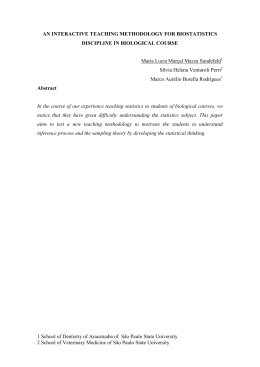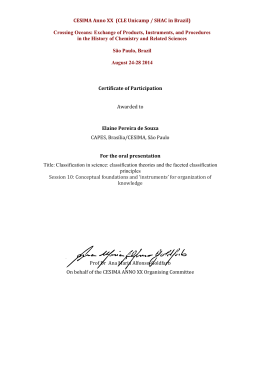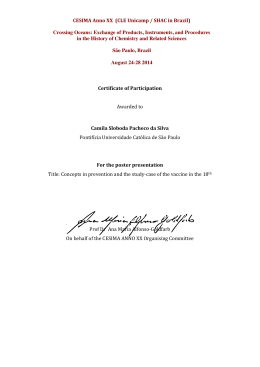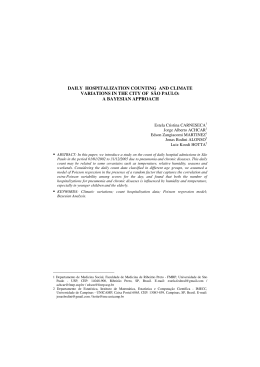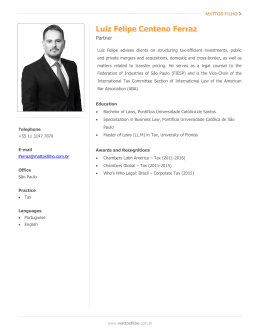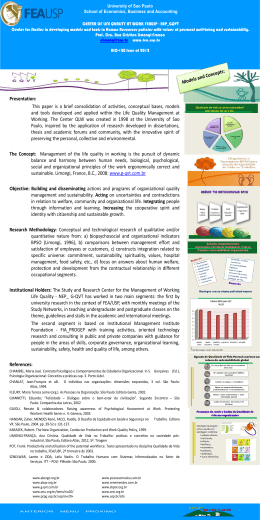Universidade de São Paulo 2013 Praça do Relógio - São Paulo Campus photo by Cecília Bastos Universidade de São Paulo is one of the most prestigious higher education and research institutions in Brazil and figures among the best universities in the world. With several campi distributed over eight cities (Bauru, Lorena, Piracicaba, Pirassununga, Ribeirão Preto, Santos, São Carlos and São Paulo) within the state of São Paulo, USP has over 90,000 undergraduate and graduate students and almost 6,000 faculty members. The schools of USP cover most of the disciplines and provide the students with a fertile study and research environment. School of Medicine - São Paulo Campus photo by Cecília Bastos Origins USP was founded in 1934 upon the unification of several pre-existing schools. The newly created Faculty of Philosophy, Languages and Literature, and Human Sciences and the School of Physical Education of the State of São Paulo were integrated along with the schools of Law, Medicine, Engineering, Pharmacy and Dentistry, as well as the “Luiz de Queiroz” College of Agriculture. In the early days, a large number of foreign professors was invited from abroad to lecture, bringing with them new standards of research from Europe. They assisted in transforming USP into an essential driving force behind the progress of the nation and, during its first twenty years of existence, several new schools were established. Finally, in the year of 1960, in the city of São Paulo, “Cidade Universitária” was inaugurated. This resulted in the unification of the majority of the schools and faculties in one campus. Subsequently, the University has expanded both in size and quality of its output. Today the University has 42 schools, 4 museums, 2 major hospitals and has become an internationally recognized center of reference in many fields of research. School of Economics, Business and Accounting São Paulo Campus photo by Francisco Emolo USP is: Comprehensive. The individual schools encompass all academic areas and include 249 undergraduate programs and 239 graduate programs. Productive. Its scientific production corresponds to at least 23% of all that is produced in Brazil. Pioneer. It holds a highly respectable position in the most important international rankings of teaching and research institutions. Tuition free. The university does not charge its students for tuition. Traditional. Its schools are among the oldest higher education institutions in the country. They have been responsible for generating knowledge since the early 19th century. Prestigious. Having an undergraduate or graduate diploma from USP facilitates the access to excellent job opportunities in Brazil and abroad. Extensive. It occupies a total area of approximately 76,314,505 m2, of which 1,823,625 m2 correspond to University buildings. São Carlos School of Engineering - São Carlos Campus photo by Umberto Patracon The university faculty has had contact with foreign professors from USP’s very beginning, particularly in certain fields of research. Some of the most outstanding examples include Claude LéviStrauss (FRA), Gérard Lebrun (FRA), David Bohm (USA), Miguel Rolando Covian (ARG), Vilém Flusser (CZ), Ernst W. Hamburger (GER), Roger Bastide (FRA), Fritz Köberle (AUS), William Hamilton (UK), Lucien Lison (BEL), Giuseppe Occhialini (ITA), Giuseppe Ungaretti (ITA), Gleb Wataghin (UKR-ITA) and André Weil (FRA). “Luiz de Queiroz” College of Agriculture - Piracicaba Campus photo by ESALQ USP schools: besides the main campus and some additional schools spread over the city of São Paulo, seven other campi are located in the cities of Bauru, Lorena, Piracicaba, Pirassununga, Ribeirão Preto, Santos and São Carlos. Due to the various fields of interest, it is possible for a student to choose in which campus to study or research. USP Symphony Orchestra - São Paulo Campus photo by Marcos Santos The university has an active role in disseminating science, culture and quality health care for citizens around the country. Strongly integrated with the local community, USP runs several hospitals, museums and public services that directly benefit the population. These range from scientific and cultural activities to innovative health care and therapy. Furthermore, most of the services provided by USP are free of charge. USP in numbers Database: 2012 Students Scientific Production Undergraduate Programs Programs 249 Yearly enrollment 10,962 Applications for the Admission Exam 146,845 Enrolled students 58,303 Number of degrees awarded 7,665 Graduate Programs Master’s Courses 332 Regular Students in Master’s programs 13,836 Number of degrees awarded in M.Sc. level 3,577 Doctorate Courses 309 Regular Students in Doctorate programs 14,662 Number of degrees awarded in Ph.D. level 2,439 Special Students* 5,263 * Non-degree seeking In Brazil 18,390 International 8,314 Indexed publications (ISI-USA) 9,893 Cultural and Outreach Activities Continnued Education Programs 993 Enrolled students 29,687 Museums (numbers of visitors/year) Paulista Museum (historical) 371,622 Museum of Contemporary Art 661,361 Museum of Archaelogy and Ethnology 34,352 Museum of Zoology 71,038 Paulista Museum - São Paulo Campus photo by Cecília Bastos International Relations The International Office of Universidade de São Paulo (http://www. usp.br/internationaloffice/) develops and implements policies that seek to favour the internationalization of the institution. Among its attributions, the International Office: Supports each of the individual schools’ local international offices in their efforts towards greater internationalization. Provides information about research and mobility opportunities for the wider USP community, including undergraduate and graduate students, professors and technical-administrative personnel. Fosters academic international cooperation. Selects, prepares and discloses information about programs and initiatives concerned with academic cooperation. Praça do Relógio - São Paulo Campus photo by Francisco Emolo International Office Address Rua do Anfiteatro, 197 Cidade Universitária São Paulo SP Brazil ZIP Code: 05508-060 http://www.usp.br/internationaloffice/ e-mail: [email protected] Visit www.usp.br Paulista Museum - São Paulo Campus photo by Hélio Nobre
Download
